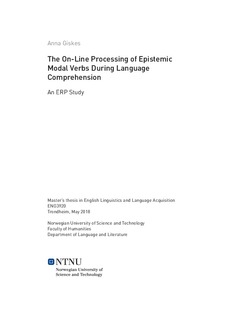| dc.description.abstract | Epistemic modal verbs enable the speaker to express attitudes about the factuality of a proposition: they signal a specific degree of likelihood that the proposition in their scope is true, as evaluated by the speaker. In this ERP experiment, we investigated the degree and timing of processing of the Norwegian epistemic modal verbs å tro (to believe) and å tvile på (to doubt). In sentences presented word for word (RSVP paradigm), we recorded ERPs of nouns that rendered propositions in the scope of these verbs (3rd person singular) either true/typical or false/atypical, as verifiable through general world knowledge, for example Tora believes/doubts that birds have wings/gills. As a control condition, we embedded the same clauses in matrix clauses with the non-modal factive verb å vite (to know). We assumed that if the verbs are processed fully at the moment of encountering the critical word, then the N400 of the critical word, being sensitive to modulations of plausibility and predictability, would be modulated by the epistemic modal values of the matrix verbs. This modulation would transpire as an attenuation of the N400 typicality effect for believe compared to know, and a further attenuation or even reversal of the effect for doubt. We observed an N400 typicality effect in both the know- and the believecondition, with a larger and more wide-spread effect for believe than for know. In the doubt-condition, we observed no N400 typicality effect, but sustained anterior negativity (more negative-going for typical words) and a central-parietal typicality effect in the same direction in the time window 500-800 ms after onset. Although additional data collection should be carried out in order to confirm the robustness of the effects in this small data set (N=12), this study indicates distinct ERP modulations by the main verbs, suggesting that at least parts of the lexical semantics of believe and doubt are processed before encountering the critical word. | nb_NO |
